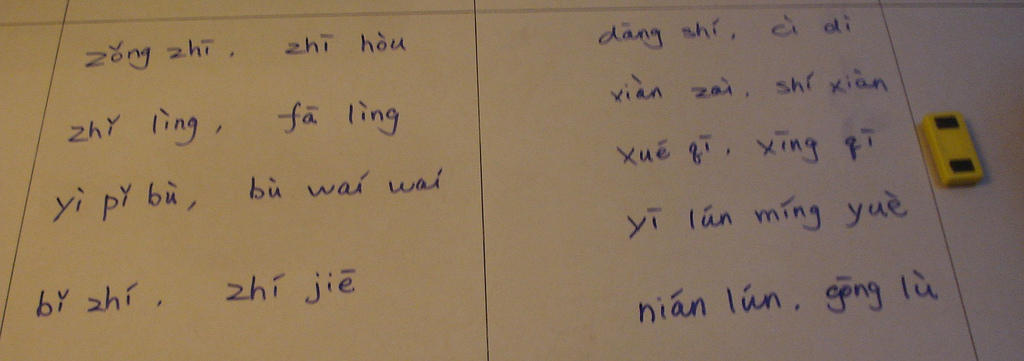“There is no single way of learning something.”
This quote from the Greek philosopher Aristotle (384-322 BCE) makes a good point about different ways of learning and is something that every good private tutor will likely keep in mind when teaching their students.
Students learning Chinese, for example, will likely struggle with new words, reproducing the tones, remembering Chinese characters, or understanding the new writing system. Every student is different and some will struggle more with these than others.
Everybody's brain is different and while some will easily remember things that they hear, others may be better at remembering what they see, read, or watch. The latter will likely learn Chinese characters more quickly while the former may be quicker to master tones.
You won't learn Chinese overnight and even just showing up to your Chinese lessons won't be enough to master the language. You'll have to work hard, remain motivated, and never lose focus.
You'll need to work outside of your Chinese classes, too. Luckily for you, the Superprof editorial team has put together a number of useful tips to help you get the most out of studying Chinese.
Don't miss our tips on the best ways to learn Mandarin, too.

Go Over Your Last Chinese Lesson Before Moving on to the Next
We can't stress enough just how difficult learning to speak Chinese is going to be. It's not impossible, but we don't want to give you the impression that it'll be easy.
Even native speakers and highly educated people haven't learned all the characters used in Chinese and as a beginner, you have quite the journey ahead of you.
The important thing is that you focus on progressing and getting better at Chinese and you'll find this is really motivating.
To start getting by, you only really need to know about 400 Chinese characters or 2/3 of Chinese's most common characters. That said, it will likely take you a few years to get to this stage.
How can you make sure that you're on the right path when you've just started beginner Mandarin classes?
Go back over each of your Chinese lessons. The worst thing that can happen is that you start to develop gaps in your knowledge and you don't realise until much further down the line.
Make sure that you're paying attention in class and listening to your teacher or tutor. The more you take in during your classes, the less you'll have to go over outside of them. Outside of class, go back over your notes and fill in any gaps you may have from the lesson.
Here are some of our tips for getting the most out of each of your Chinese lessons.
- Make sure you study in the right conditions. You'll want to be able to focus.
- Disconnect all your devices when going back over the previous lesson to remove distractions.
- Have a break every half hour or so to keep your mind fresh.
- Don't get distracted by social media or TV.
- Make notes of everything that you don't understand so that you can bring it up with your Mandarin teacher the next time you see them. These notes can include translations, Pinyin transcriptions, the line order for Chinese characters, or even the meaning of certain things.
- Read your notes daily just before going to bed.
Are you still struggling even though you're doing all these things?
It's a good idea to sum things up regularly.
Make Flashcards and Summarise Your Chinese Lessons
Flashcards are a great way to summarise your Chinese lessons and make them easier to remember. In fact, this works for any language be it French, Spanish, Japanese, etc.
You can also put up posters with Chinese characters around the home to help you practise your Mandarin pronunciation and remember new vocabulary.
Rather than going over pages and pages of notes, it's a good idea to have shorter notes, bullet points, or flashcards to make memorising everything much more manageable.

Here are some more tips to help you learn Chinese by summarising your lessons:
- After every Chinese lesson, manually or digitally recreate your notes.
- Summarise the key parts of your Chinese lessons with bullet points and short sentences.
- If necessary, restructure the notes to give them a clearer and more logical flow.
- Use colours and other visual symbols to make points clearer and highlight key information.
- Go over key Chinese words, their definitions, and their translations.
- Use mnemonic devices to remember Chinese characters and words.
- Condense Chinese grammatical points into easy-to-understand charts and graphs.
- Keep flashcards simple with only one idea per card be it the Pinyin transcription, pronunciation, the Chinese phonetic alphabet with its 23 initial consonants and 35 final vowels, tones in Mandarin, Chinese grammatical rules, the direction of strokes in Chinese calligraphy, Chinese vocabulary by theme, etc.
Summarising your lessons in the form of flashcards can make learning new vocabulary and pronunciation much easier. You can also get into the habit of repeating new vocabulary regularly until you remember it.
- Learn how to say “hello” in Chinese: « nĭ hăo » (你 + 好)
- Learn how to say “good-bye” in Chinese: « zài jiàn » (再 + 见)
- Review your numbers: 八 (two), 五 (five)
When you can't reach your Mandarin teacher or tutor, you can always look to the internet for help.
Work Little and Often Rather than Cramming
No matter what you're learning, be it a new language or a musical instrument, revising just before your lesson doesn't work.
It's much better to regularly spend 5-to-10 minutes learning or studying something than spending hours of intensive study.
It can also help to simulate immersion by living as much of your life as you can in Chinese.
There are also plenty of great Mandarin learning tools you can use to help.
Use Chinese Immersion to Get Ready for Your Chinese Lessons
Why should you bother immersing yourself in the Chinese language when your trip isn't until next year?
You'll want to get your brain ready for it and the more familiar your brain is with a language, the easier it'll be to learn.
Chinese is a tonal language so there are melodic patterns that you need to get your brain used to.
To get the most out of your Chinese lessons, it's a good idea to regularly listen to spoken Chinese, particularly when spoken by native Mandarin speakers.
Fortunately, you have a lot of options:
- Read or listen to the news from China, Taiwan, or Singapore.
- Watch Chinese-language cinema (with English subtitles initially).
- If your city has a Chinese neighbourhood or Chinatown, go there and do some shopping.
- Download and listen to Chinese podcasts.
- Speak and interact in Chinese on social networks with Chinese friends.
- Install and use apps for learning Chinese and use them to regularly practise.
- Install a free Chinese learning app to listen to one lesson a day and get ahead of your Mandarin course.

Watch Videos in Chinese
Just like any other language, watching online videos (like YouTube, for example) is a great way to help you improve your Chinese.
However, since YouTube isn't available in China, you can find far more Chinese-language videos on the Chinese equivalent of YouTube, Youku.
If you're just a beginner, though, the Mandarin in most videos will likely be too advanced and you'll want to study basic Chinese before moving on to videos that are aimed at native or fluent Chinese speakers.
That said, you can familiarise yourself with the sounds and common words used in Chinese just by watching Chinese videos and listening.
Learn Chinese with Native Speakers
To really improve in Chinese, it can help to work with native speakers. Consider finding a native Chinese speaker and organising a language exchange with them so they can help you with your Mandarin Chinese while you help them with their English.

There are a number of good resources on Mosalingua for learning how to speak Chinese like a native.
The only issue is that this comes at a cost and while you get what you pay for with every resource, the initial costs of finding a native Mandarin speaker might be too much for some.
Discover how to find the perfect Chinese teacher.
Learn to Speak Chinese with Apps
Apps are a great way to have loads of Chinese language learning resources right there in your pocket.
There
There are more than 500 million Chinese watching videos online, and giving Chinese lessons is a way for them to make some money while learning English, French, Spanish, German or Portuguese.

The HelloTalk app is a great way to learn Chinese while speaking with native Mandarin speakers. It works a bit like a social network for language exchanges and you can get in touch and start helping Chinese speakers with their English while they help you improve your Chinese.
It's quite simple to get started. Here's what you need to do:
- Download the app onto your smartphone
- Create a profile (e-mail address, password, name, birthdate, profile photo)
- Enter the information about the language you speak and where you're from
- Enter the language you want to learn (Chinese in this case)
- Set your level of proficiency
- Start finding language partners!
This is a great way to get free Mandarin lessons while also practising your written Chinese.
How soon is your trip to China?
You can use the internet to find out more about Chinese culture, practise Chinese, and even enrol in intensive language courses before you get there.
Find out more about how much Mandarin lessons should cost. Find Chinese tutors on Superprof. No matter where you live, you can find face-to-face tutors or online tutors to help you with your Chinese.
Summarise with AI:















